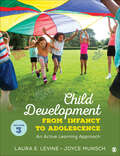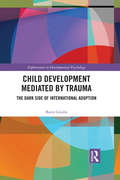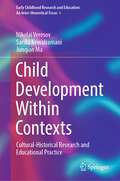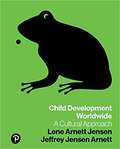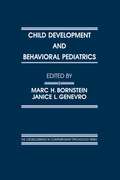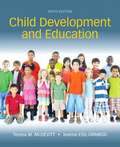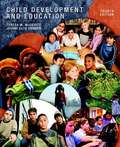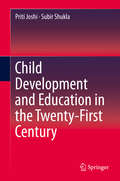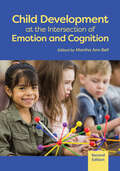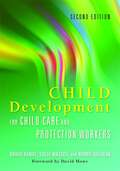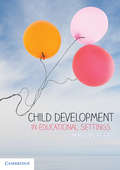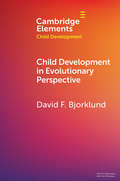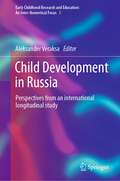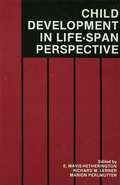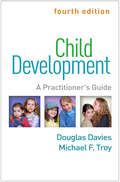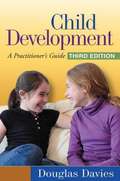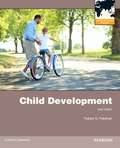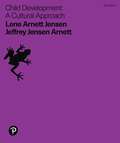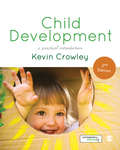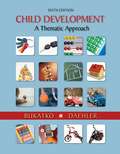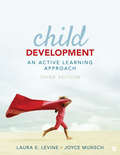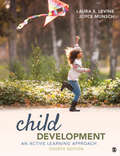- Table View
- List View
Child Development From Infancy to Adolescence: An Active Learning Approach
by Laura E. Levine Joyce MunschIn Child Development from Infancy to Adolescence, Third Edition, Laura Levine and Joyce Munsch employ a chronological organization to introduce topics within the field of child development through unique and engaging Active Learning opportunities. Within each chapter of this innovative, pedagogically rich text the authors introduce students to a wide range of real-world applications of psychological research to child development. With this edition, the text enhances its coverage of cultural examples while emphasizing diversity. The Active Learning and Journey of Research content incorporated throughout the book foster a dynamic and personal learning process for students. The authors cover the latest topics shaping the field of child development - including a focus on neuroscience, diversity, and culture - without losing the interest of undergraduate students.
Child Development Mediated by Trauma: The Dark Side of International Adoption (Explorations in Developmental Psychology)
by Boris GindisDrawing on clinical data obtained through the study of children adopted from overseas orphanages, the author of this cutting-edge text applies the Developmental Trauma Disorder (DTD) conceptual framework to the analysis of psychological, educational and mental health impact of the early childhood trauma on development. A massive scale of international adoption of children, victims of profound neglect and deprivation, combined with the fundamental change in a child's social situation of development after adoption, offers a valuable opportunity to explore the concept of Developmental Trauma Disorder, in particular, developmental delays, emotional vulnerability, "mixed maturity", cumulative cognitive deficit, and post-orphanage behavior patterns, being presented by many adoptees long after the adoption. By focusing on the neurological and psychological nature of childhood trauma, Dr. Gindis offers a unique approach to understanding the ongoing impacts of DTD and the ways in which any subsequent neuropsychological, educational, and mental health issues might be assessed. Offering an evidence-based exploration of DTD, and a critique of "conventional" approaches to rehabilitation and remediation of international adoptees, this book will be of great interest to researchers in the fields of psychology, mental health, education and child development; as well as clinicians involved in trauma treatment and international adoption.
Child Development Within Contexts: Cultural-Historical Research and Educational Practice (Early Childhood Research and Education: An Inter-theoretical Focus #6)
by Nikolai Veresov Sarika Kewalramani Junqian MaThis book examines the pedagogical encounters within children's ecological and socio-cultural historical contexts, and aspects of playful learning and development within these contexts. It addresses research and practices varying across learning contexts, providing easily adaptable exemplary practices leading to children's positive learning and development. The book offers a unified general cultural-historical theoretical model for exploring new contexts at different stages of children's learning and development. It suggests studying contexts as a source of development, as social situations of development. It analyzes play, early learning and the transition from play to school learning. It also explores the role of teachers and parents in supporting the development of executive functions, digital literacy, creative inquiries, problem solving and creativity as necessary and important prerequisites of children's school academic achievements. This volume contributes to the discourse on how children's learning is shaped in the 21st century era. It equips educators and parents with new and effective methods of creating developing contexts in their daily practice and to fully utilize the developing potential of existing contexts.
Child Development Worldwide: A Cultural Approach
by Jeffrey Arnett Lene JensenChild Development Worldwide presents a topical examination of all stages of development — from prenatal development through middle childhood, adolescence, and emerging adulthood — through the engaging lens of culture. Cross-cultural examples integrated throughout the narrative reveal the impact of cultural factors both in the US and around the world. Authors Lene Arnett Jensen and Jeffrey Jensen Arnett emphasize culture to foster a thorough, balanced view of development that prepares students to face challenges in our diverse and globalized world — whether they travel the globe or remain in their hometowns.
Child Development and Behavioral Pediatrics (Crosscurrents in Contemporary Psychology Series)
by Marc H. Bornstein Janice L. GenevroBeing sick is a normal part of childhood, and being seriously ill is the unfortunate lot of many children. Every child in the United States has some contact with the healthcare system at some time, and it is estimated that one of every two children or adolescents is hospitalized as a result of illness or injury. Being injured, undergoing routine medical procedures, getting sick, or being hospitalized confront children with challenges on many levels--physical, mental, emotional, and social. The premise of this volume is that developmental and psychological factors are central elements in many current problems in child health such as persistent crying in infants, sources of children's injury and respiratory illness, children's coping with medical procedures, childhood trauma, and physical and mental well-being in adolescence. Understanding, promoting, and maintaining children's health, therefore, depend to a great extent--and are likely to depend even more in the future--on elucidating the determinants and consequences of children's and parents' health-related behaviors and attitudes. Chapter contributors include physicians and psychologists who apply principles of developmental and social psychology to their research on specific problems in children's health. Their offerings delineate current areas of collaboration between developmental psychology and behavioral pediatrics. These perspectives should prompt researchers and practitioners to explore additional ways in which more extensive endeavors at the interface of these two disciplines will facilitate efforts to understand children's health behaviors and foster children's well-being. Attention to this work should lead to more direct clinical applicability and translation for preventive policy strategies as well as therapeutic interventions.
Child Development and Education
by Jeanne Ormrod Teresa McDevittWritten by a developmentalist and an educational psychologist, Child Development and Education bridges the gap between theory and practice, showing those who teach and care for infants, children, and adolescents how to apply developmental research and theory to everyday practice. This topically organized text describes developmental phenomena and provides instruction and opportunities to practice observations of and analyses of what children say, do, and create, ensuring that educators can make informed decisions that meet children's and adolescents' needs. The Enhanced Pearson eText features embedded video, assessments, teacher certification exam prep, and video analysis exercises.
Child Development and Education (Fourth Edition)
by Teresa Mcdevitt Jeanne E. OrmrodWith a unique and engaging perspective,Child Development and Education, Fourth Edition is the only comprehensive child development text written specifically for educators. Because it is written by a developmentalist and an educational psychologist team, it provides the coverage and research found in more traditional child development texts but also then helps readers understand how to use this information as educators. Unique features include: how the text illustrates key concepts by using children's and adolescents' schoolwork, artwork, and interview excerpts, as well as case studies and video examples authentic artifacts from children and adolescents;Observation Guidelines tables with educational applications; Development and Practice features with concrete strategies for facilitating children's development and learning; and extensive coverage of diversity and its implications for helping all youngsters thrive. New to the fourth edition, accompanying each text is an innovative online resource,MyEducationLab, containing "Building Teaching Skills" exercises, practice quizzes, homework and review exercises, videos for analysis, "Understanding Research" exercises (in which students read and interpret research articles), and supplementary readings. All of the many features of the text and its abundant resources help readers actually see development, not simply read about it-preparing educators and those working with children and adolescents to apply development concepts to actual practice.
Child Development and Education in the Twenty-First Century
by Priti Joshi Subir ShuklaThis book provides an in-depth understanding of how children’s development at different stages of their lives interfaces with the kind of education and support they need at school and home. It examines closely how education, in turn, influences their development and prepares them for an uncertain future. The chapters focus on the rapid developments of the 21st century that are changing the nature of education, especially the shift needed to being able to sift through and meaningfully deal with overwhelming volumes of information now available. This book helps readers understand how children can benefit from the digital environment while avoiding its pitfalls. Keeping in mind that in today’s world parents are getting to spend less time with their children, the authors provide research-backed ideas on how they can best enable children’s development, including their thoughts, feelings and notions of self. Given the increasing disparities, there is a perceptive analysis of how education can build an awareness of equity in a context marked by diversity and disadvantage. This book addresses issues such as these in a reliable, scholarly yet accessible manner, for students, young researchers and lay readers. Consequently, it is a valuable source of fundamental insights and understanding for educators, policy-makers, educational administrators and students of human and child development, education, and teacher training courses.
Child Development at the Intersection of Emotion and Cognition (Human Brain Development Series)
by Martha Ann BellIn this extensively revised edition, Martha Ann Bell and her contributors synthesize the newest research on how cognitive and emotional processes influence each other in child development. Historically, research in child development has treated cognitive processes as separate and distinct from social-emotional processes. However, many of the factors that influence self-regulation are also closely linked to cognitive development. For example, genetics, prenatal environment, relationships, language, and physiological processes are all links between emotion and cognition in child development. The first edition of this volume greatly increased our understanding of emotion-cognition integration. This second edition incorporates new longitudinal research demonstrating this integration during infancy and throughout childhood. Chapters incorporate new research methods based on technological advances that have greatly enhanced our ability to examine early human brain development. The resulting volume is a critical read for those interested in understanding how brain development influences our behavior and social interactions.
Child Development for Child Care and Protection Workers
by Brigid Daniel Sally Wassell Robbie GilliganChild Development for Child Care and Protection Workers is a classic text for students and practitioners in the child care and protection field which summarises important current thinking on child development and applies it directly to practice. The book covers key issues such as resilience and vulnerability and the impact of protective or adverse environments. Different stages of development (infancy, school age and adolescence) are discussed, and attachment theory is used to offer insights into the impact of abuse and neglect on development. A key feature is the inclusion of case studies and activities to allow the reader to improve their understanding and reflect on good practice. This second edition is fully updated to reflect the new policy context and multi-disciplinary practice, and contains updated practice examples to take into account contemporary issues affecting children and young people. This book encourages practitioners to consider each child as an individual with unique circumstances, and links theory and practice in an imaginative and sympathetic way. It will be essential reading for all child care and protection workers.
Child Development in Educational Settings
by Marilyn FleerChild Development in Educational Settings provides a comprehensive introduction to traditional and contemporary theories of development and learning in the contexts of early childhood and primary education. Drawing upon the experiences and perspectives of children, families, educators and Aboriginal and Torres Strait Islander scholars, Marilyn Fleer provides insights into significant theories and approaches, including cultural-historical, constructivist, social constructivist, maturational and ecological systems. The book features four major case studies, which are revisited throughout, to examine how learning and development can be reimagined within socially, culturally and linguistically diverse communities. This approach enables readers to use theories to analyse and measure learning and development in planning and curriculum, and to feel empowered to enact change in their educational settings. Written in an engaging and accessible style, Child Development in Educational Settings is an essential resource for pre-service teachers and professionals alike.
Child Development in Evolutionary Perspective (Elements in Child Development)
by David F. BjorklundNatural selection has operated as strongly or more so on the early stages of the lifespan as on adulthood. One evolved feature of human childhood is high levels of behavioral, cognitive, and neural plasticity, permitting children to adapt to a wide range of physical and social environments. Taking an evolutionary perspective on infancy and childhood provides a better understanding of contemporary human development, predicting and understanding adult behavior, and explaining how changes in the early development of our ancestors produced contemporary Homo sapiens.
Child Development in Russia: Perspectives from an international longitudinal study (Early Childhood Research and Education: An Inter-theoretical Focus #3)
by Aleksander VeraksaThis book presents unique results of complex studies from the all-Russian longitudinal study “Grow with Russia”. In the framework of the cultural-historical concept, it focuses on the social situation of development, which is organized by adults, and its influence on cognitive and emotional development of children. It examines the role of the traditional play in children's development in modern conditions.The book explores the changes in social situation of development due to the digitalization of the world and its impact on child development, child groups and play development. The book searches for cognitive cultural tools as means of concept acquisition by preschool children in different domains as well as key factors that influence effectiveness of different cultural tools usage. This book provides international perspectives, making results from the study applicable to different cultural contexts.
Child Development in a Life-Span Perspective
by Richard M. Lerner E. Mavis Hetherington Marion PerlmutterComprised of papers written by members of the Social Science Research Council Subcommittee on Child Development in Life-Span Perspective, this book provides a representation of the current status of the relation between child development and the life- span. It suggests the possible synthesis of these two fields from both conceptual and empirical evidence. Theories and methods concerning the social, psychological, and anatomical influences on children's cognitive development through adolescence are highlighted.
Child Development, Fourth Edition: A Practitioner's Guide (Clinical Practice with Children, Adolescents, and Families)
by Douglas Davies Michael F. TroyNow in a revised and updated fourth edition, this trusted text and professional resource provides a developmental framework for clinical practice. The authors examine how children's trajectories are shaped by transactions among family relationships, brain development, and the social environment. Risk and resilience factors in each of these domains are highlighted. Covering infancy, toddlerhood, the preschool years, and middle childhood, the text explores how children of different ages typically behave, think, and relate to others. Developmentally informed approaches to assessment and intervention are illustrated by vivid case examples. Observation exercises and quick-reference summaries of each developmental stage facilitate learning. New to This Edition *Incorporates a decade's worth of advances in knowledge about attachment, neurodevelopment, developmental psychopathology, intervention science, and more. *Toddler, preschool, and school-age development are each covered in two succinct chapters rather than one, making the book more student friendly. *Updated throughout by new coauthor Michael F. Troy, while retaining Douglas Davies's conceptual lens and engaging style.
Child Development, Third Edition
by Douglas DaviesThis widely used practitioner resource and course text provides an engaging overview of developmental theory and research, with a focus on what practitioners need to know. The author explains how children's trajectories are shaped by transactions among early relationships, brain development, and the social environment. Developmental processes of infancy, toddlerhood, the preschool years, and middle childhood are described. The book shows how children in each age range typically behave, think, and relate to others, and what happens when development goes awry. It demonstrates effective ways to apply developmental knowledge to clinical assessment and intervention. Vivid case examples, observation exercises, and quick-reference tables facilitate learning. New to This Edition Incorporates the latest research on the developing brain, attachment, risk and protective factors, and all domains of development. Neuroscience information is more fully integrated throughout. New material on preadolescence, foster care, trauma, and social policy. Expanded discussions of developmentally appropriate interventions, including new case examples.
Child Development:
by Robert S. FeldmanMost balanced presentation of research and applications Feldman's Child Development, 6e offers students a balanced and up-to-date study of theory and research with a focus on application to students' personal lives and future careers. Child Development 6e introduces students to the theories, research, and applications of child and adolescent development. Organized chronologically, the book features a variety of student-focused tools that make the study of development interesting and engaging. It highlights the interrelationships between theory, research, and application, accentuating the scope and diversity of the field. It also illustrates how child developmentalists use theory, research, and applications to help solve significant social problems. An emphasis on practical, take-home information provides students with lessons they can use both now and in the future. Teaching & Learning Experience Personalize Learning The new MyDevelopmentLab delivers proven results in helping students succeed, provides engaging experiences that personalize learning, and comes from a trusted partner with educational expertise and a deep commitment to helping students and instructors achieve their goals. Apply Developmental Science and Engage Students - A strong balance of research and applications maintains student interest throughout every section in the text. Improve Critical Thinking Reflective questions included within MyVirtualChild encouraging students to think critically and apply chapter content to real life situations as they raise their own virtual child. Explore Research "From Research to Practice" and "Are You an Informed Consumer of Development?" show students how they can apply the concepts they're learning in the text to real life situations. Understand Culture and Diversity "Developmental Diversity" sections highlight issues relevant in today's multicultural society. Support Instructors - Class Prep, MyVirtualChild, Video embedded PowerPoints, MyTest, clicker questions, and an instructor's manual provide extensive support for instructors. Note: MyDevelopmentLab does not come automatically packaged with this text. to purchase MyDevelopmentLab, please visit: www. mydevelopmentlab. com or you can purchase a valuepack of the text + MyDevelopmentLab (at no additional cost). VP: 9780205258840
Child Development: A Cultural Approach
by Jeffrey Jensen Arnett Lene Arnett JensenChild Development: A Cultural Approach helps students learn how to think culturally about human development throughout our diverse, increasingly globalized world. Author Jeffrey Jensen Arnett and new co-author Lene Arnett Jensen weave an engaging chronological narrative that traces development from birth through emerging adulthood, integrating current research and cross-cultural examples from around the globe throughout. For the 3rd Edition, the authors utilize an expanded chapter organization and a fresh approach — characterized by additional cross-cultural perspectives — to better highlight the cultural aspects of development.
Child Development: A Practical Introduction
by Dr Kevin CrowleyFocusing on the earliest years (0-8), the new edition of this bestselling textbook continues to provide a comprehensive overview of the research, theory, and current practice in the field of child development. The new edition is fully up to date with current policy and legislation and now includes; · New ‘Research boxes’ in each chapter helping students link theory to practice · Increased coverage on children’s social and emotional development · A brand new companion website including a selection of free SAGE Journal articles, annotated further readings, weblinks and useful online materials.
Child Development: A Practical Introduction
by Dr Kevin CrowleyFocusing on the earliest years (0-8), the new edition of this bestselling textbook continues to provide a comprehensive overview of the research, theory, and current practice in the field of child development. The new edition is fully up to date with current policy and legislation and now includes; · New ‘Research boxes’ in each chapter helping students link theory to practice · Increased coverage on children’s social and emotional development · A brand new companion website including a selection of free SAGE Journal articles, annotated further readings, weblinks and useful online materials.
Child Development: A Thematic Approach
by Danuta Bukatko Marvin W. DaehlerBukatko/Daehler's CHILD DEVELOPMENT: A THEMATIC APPROACH provides a comprehensive, topically organized, up-to-date picture of development from conception to adolescence. Most important, it draws students' attention to the themes that replay themselves throughout the course of development, fundamental issues that resurface continually and that provide coherence to sometimes seemingly disparate research. The themes can serve as frameworks to help students further understand and remember the multitude of facts about child development. Bukatko/Daehler's sixth edition text draws on five themes, Nature and Nurture, Sociocultural Influence, Continuity/Discontinuity, Interaction among Domains, and Risk/Resilience. By drawing on these themes, the authors hope to stimulate readers to think about the process of development, or why it proceeds as it does. Through new For Your Review and Reflection sections, the authors also hope students will engage with the text and become more adept critical thinkers, who are more likely to appreciate the ramifications of theory and research for applied issues such as parenting practices, education, and social policy for children, which are ultimately concerns for us all.
Child Development: An Active Learning Approach
by Laura E. Levine Joyce MunschIn the Third Edition of the topically organized Child Development: An Active Learning Approach, authors Laura E. Levine and Joyce A. Munsch invite students to take an active journey toward understanding the latest findings from the field of child development. Using robust pedagogical tools built into the chapter narratives, students are challenged to confront myths and misconceptions, participate in real-world activities with children and independently, and utilize video resources and research tools to pursue knowledge and develop critical thinking skills on their own. This new edition covers the latest findings on developmental neuroscience, positive youth development, the role of fathers, and more, with topics of diversity and culture integrated throughout. More than a textbook, this one-of-a-kind resource will continue to serve students as they go on to graduate studies, to work with children and adolescents professionally, and to care for children of their own.
Child Development: An Active Learning Approach
by Laura E. Levine Joyce MunschIn the Third Edition of the topically organized Child Development: An Active Learning Approach, authors Laura E. Levine and Joyce A. Munsch invite students to take an active journey toward understanding the latest findings from the field of child development. Using robust pedagogical tools built into the chapter narratives, students are challenged to confront myths and misconceptions, participate in real-world activities with children and independently, and utilize video resources and research tools to pursue knowledge and develop critical thinking skills on their own. This new edition covers the latest findings on developmental neuroscience, positive youth development, the role of fathers, and more, with topics of diversity and culture integrated throughout. More than a textbook, this one-of-a-kind resource will continue to serve students as they go on to graduate studies, to work with children and adolescents professionally, and to care for children of their own.
Child Development: An Active Learning Approach
by Laura E. Levine Joyce MunschIn the topically organized Child Development: An Active Learning Approach, Fourth Edition, authors Laura E. Levine and Joyce Munsch take students on an active journey toward understanding children and their development. Active Learning activities integrated throughout the text capture student interest and turn reading into an engaged learning process. Through the authors’ active learning philosophy, students are challenged to test their knowledge, confront common misconceptions, relate the material to their own experiences, and participate in real-world activities independently and with children. Because consuming research is equally important in the study of child development, Journey of Research features provide both historical context and its links to today’s cutting-edge research studies. Students will discover the excitement of studying child development while gaining skills they can use long after course completion. This title is accompanied by a complete teaching and learning package.
Child Development: An Active Learning Approach
by Laura E. Levine Joyce MunschIn the topically organized Child Development: An Active Learning Approach, Fourth Edition, authors Laura E. Levine and Joyce Munsch take students on an active journey toward understanding children and their development. Active Learning activities integrated throughout the text capture student interest and turn reading into an engaged learning process. Through the authors’ active learning philosophy, students are challenged to test their knowledge, confront common misconceptions, relate the material to their own experiences, and participate in real-world activities independently and with children. Because consuming research is equally important in the study of child development, Journey of Research features provide both historical context and its links to today’s cutting-edge research studies. Students will discover the excitement of studying child development while gaining skills they can use long after course completion. This title is accompanied by a complete teaching and learning package.
